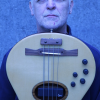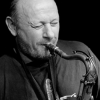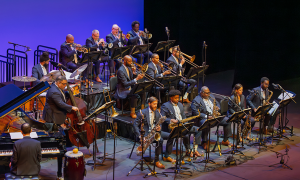Home » Jazz Articles » Live Review » Dave Douglas & Trish Clowes: Eyes Up / Next Experiment A...
Dave Douglas & Trish Clowes: Eyes Up / Next Experiment At Bray Jazz Festival

Courtesy John Cronin
I’m very grateful to be back. It’s such a special festival … that you have all come here to share the spirit of this music with us really means a lot.
—Dave Douglas
Mermaid Arts Centre
Bray Jazz Festival
Bray, Ireland
May 5, 2024
The smaller stages remained abuzz well into the wee hours on the last night of Bray Jazz Festival, but a little earlier the final act on the main stage—in the Mermaid Arts Centre—saw another full house treated to an exciting double bill. Opening the evening was pan-national group Next Experiment, while the headline slot brought old BJF favorites Dave Douglas and Trish Clowes back to the Mermaid with a new project.
Next Experiment has risen from the ashes of CEO Experiment, a renowned Dublin-based trio that featured Peruvian drummer Cote Calmet, Venezuelan pianist Leopoldo Osio and Hungarian electric bassist Peter Erdei. Formed in 2013, the trio released the self-produced CEO Experiment in 2015. In 2017 the trio was joined by modern guitar great Kurt Rosenwinkel for a sold-out gig at The Sugar Club. The future was looking extremely rosy for CEO Experiment, but the Rosenwinkel collaboration was to be the trio's zenith. The following year the wheels came off when Calmet relocated to Spain.
Osio and Erdei, however, have kept the spirit alive, expanding the line-up in 2019 with the addition of Cork trombonist Paul Dunlea, Italian tenor saxophonist Gianni Gagliardi and Spanish drummer Gonzalo Del Val. The group's debut album was soon in the can, but thanks to the pandemic its release was delayed until 2024. This gig served as the album's official launch.
The lively "Awakening" set the tone for the set, with the twin-horn front line introducing the head before short, punchy solos from Dunlea and Gagliardi, followed by a more expansive exploration by Osio. A fine pianist, Osio is also the group's sole composer. "Calle Constitución," demonstrated Osio's keen sense of orchestration, the music growing organically from balladic terrain to pastures altogether grander in design.
Erdei's inventive melodic lines and Del Val's cantering rhythms injected real brio on "Acceptance;" Dunlea's pedal board transformed the trombone into a futuristic jazz-funk weapon, contrasting with Gagliardi's acoustic, though no less adventurous approach. Thomas Dolby's "Budapest by Blimp," a left-field choice on paper, was reimagined as a power ballad, with unison horns carrying the repeating motif over Osio's searching lines.
Latin-jazz descarga colored the penultimate number, a pulsating fiesta of fiery rhythms and incendiary soloing from Gagliardi and Osio. The final number, the as yet unrecorded "Orinoco Odyssey" underlined Osio's arranging skills, his considerable chops and his connection to the swing tradition. In a stirring finale piano and horns locked in a unison riff as Del Val worked his kit feverishly. The eventual release ushered in generous applause from an appreciative audience.
Trumpeter Dave Douglas first performed at BJF in 2007, an appearance which spawned the live album Moonshine (Greenleaf, 2007), which All About Jazz's John Kelman awarded a rare five-star review. In 2018, Douglas returned to BJF with Joe Lovano and their Sound Prints quintet.
Like Douglas, tenor saxophonist Trish Clowes was also making a return to the Mermaid Arts Centre, having played the venue with her My Iris quintet on a Music Network tour in February 2018. From that gig "Lightning Les" found its way onto Ninety Degrees Gravity (Bash Records, 2019).
But Douglas and Clowes have more in common than the coincidence of recording in the Mermaid Arts Centre. What unites them more deeply is an affinity for the music of Wayne Shorter, or more specifically his questing spirit of adventure; There was plenty of that in this performance by Douglas' and Clowes' Eyes Up quintet.
Big on energy, groove and tasty soloing, the opening number set the tone for the performance as a whole. With no bassist in the line-up, guitarist Chris Montague, in tandem with keyboardist Ross Stanley and drummer Joel Barford, played a pronounced rhythmic role, though his solo forays were every bit as thrilling as those by Douglas and Clowes.
Besides the individual virtuosity, what was most striking was the compositional range of the unflinchingly contemporary material. On one number, (song titles remained mostly under wraps) Ross, on organ, and Montague's pedal dynamics created swirling psychedelic waves that Douglas and Clowes rode in thrilling overlapping lines. One slower, blues-hued composition was the closest the quintet veered to formula, with Montague peeling off with a spiky solo that might have owed just a little to John Scofield.
On the whole, however, the music was tantalizingly unpredictable. Hymnal reverie morphed into wily abstraction, arrhythmic introspection ceded ground to urgent rhythms, tightly woven harmonies dissolved into fiercely independent overlapping lines. Douglas and Clowes share writing duties in Eyes Up, though whether they co-write or bring their respective tunes to the table was unclear, which says something for the symmetry so obviously at play.
It was most definitely a Douglas tune, "The Night Has 500 Eyes" that closed the set. Underpinned by Hammond organ swing and Barford's in-the-pocket groove, there were closing solos from Douglas, Clowes, Stanley and Montague, with the guitarist's gnarly blues gnashing of strings stealing the show.
On this evidence, Eyes Up is far too potent a combo to be a one-off project. With Clowes on Douglas' Greenleaf label all the pieces are certainly in place. And on nights like this jazz seems to be in extremely rude health.
Tags
Live Review
Dave Douglas
Ian Patterson
Ireland
Dublin
Trish Clowes
CEO Experiment
cote calmet
Leopoldo Osio
Peter Erdei
Kurt Rosenwinkel
a sold-out gig at The Sugar Club
Paul Dunlea
Gianni Gagliardi
Gonzalo Del Val
Moonshine
John Kelman
joe lovano
a Music Network tour
Ninety Degrees Gravity
Wayne Shorter
Chris Montague
Ross Stanley
Joel Barford
John Scofield
PREVIOUS / NEXT
Support All About Jazz
 All About Jazz has been a pillar of jazz since 1995, championing it as an art form and, more importantly, supporting the musicians who make it. Our enduring commitment has made "AAJ" one of the most culturally important websites of its kind, read by hundreds of thousands of fans, musicians and industry figures every month.
All About Jazz has been a pillar of jazz since 1995, championing it as an art form and, more importantly, supporting the musicians who make it. Our enduring commitment has made "AAJ" one of the most culturally important websites of its kind, read by hundreds of thousands of fans, musicians and industry figures every month.
































